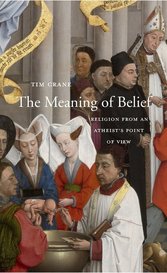
The Meaning of Belief
Religion from an Atheist's Point of View
Harvard University Press 2017
I characterise religious belief in terms of two things: first, what I call the 'religious impulse', the sense that there must be something that transcends all we see around us; and second, the phenomenon of identification with other members of the same religious group. The picture of religion and religious belief I sketch here is very different from the picture painted by Richard Dawkins and other recent atheist writers. I suggest that the inadequacy of their picture is one reason for the stagnation of of the current public debate.
Reviews in New York Times, Publishers' Weekly, Wall Street Journal, TLS, THE, LA Review of Books, The Tablet, New York Review of Books, Mind
Translations: German, Hungarian, Polish, French
Religion from an Atheist's Point of View
Harvard University Press 2017
I characterise religious belief in terms of two things: first, what I call the 'religious impulse', the sense that there must be something that transcends all we see around us; and second, the phenomenon of identification with other members of the same religious group. The picture of religion and religious belief I sketch here is very different from the picture painted by Richard Dawkins and other recent atheist writers. I suggest that the inadequacy of their picture is one reason for the stagnation of of the current public debate.
Reviews in New York Times, Publishers' Weekly, Wall Street Journal, TLS, THE, LA Review of Books, The Tablet, New York Review of Books, Mind
Translations: German, Hungarian, Polish, French
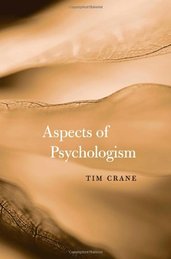
Aspects of Psychologism
Harvard University Press 2014
A collection of 16 of my essays on intentionality, perception and consciousness, with an introduction that unifies the essays around the theme of 'psychologism about the psychological'.
In 'On Sense and Reference' Frege distinguished between the sense of a word, its reference and the associated 'idea'. Sense and reference have been central concepts in semantics and the philosophy of language; they have also played a role in theories of mind in analytic philosophy. But what about what Frege called 'ideas'? As I use the term, psychologism holds that the study of the mind should be concerned largely with these things (Frege's word was Vorstellungen, sometimes translated as 'representations') rather than solely with sense and reference.
Reviews by Farid Masrour (NDPR), Paul Noordhof (Analysis), Mary Carman (Journal of Consciousness Studies PAYWALL), Robert Zaborowski (Metapsychology Online)
Harvard University Press 2014
A collection of 16 of my essays on intentionality, perception and consciousness, with an introduction that unifies the essays around the theme of 'psychologism about the psychological'.
In 'On Sense and Reference' Frege distinguished between the sense of a word, its reference and the associated 'idea'. Sense and reference have been central concepts in semantics and the philosophy of language; they have also played a role in theories of mind in analytic philosophy. But what about what Frege called 'ideas'? As I use the term, psychologism holds that the study of the mind should be concerned largely with these things (Frege's word was Vorstellungen, sometimes translated as 'representations') rather than solely with sense and reference.
Reviews by Farid Masrour (NDPR), Paul Noordhof (Analysis), Mary Carman (Journal of Consciousness Studies PAYWALL), Robert Zaborowski (Metapsychology Online)
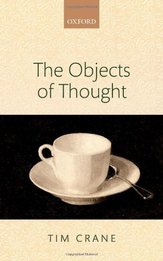
The Objects of Thought Oxford University Press 2013
This book addresses the ancient question of how it is possible to think about what does not exist.
Reviews by:
Peter Simons (TLS)
Pierre Jacob (Notre Dame Philosophical Reviews)
Niall Connolly (Philosophical Quarterly)
Guy Longworth (Philosophy)
Raamy Majeed (Australasian Journal of Philosophy)
Michelle Montague (Analysis)
Anthony Everett (Mind)
Alberto Voltolini (Dialectica)
Jocelyn Benoist (European Journal of Philosophy)
Lee Walters (Disputatio)
Author Meets Critics session at 2015 Pacific APA
This book addresses the ancient question of how it is possible to think about what does not exist.
Reviews by:
Peter Simons (TLS)
Pierre Jacob (Notre Dame Philosophical Reviews)
Niall Connolly (Philosophical Quarterly)
Guy Longworth (Philosophy)
Raamy Majeed (Australasian Journal of Philosophy)
Michelle Montague (Analysis)
Anthony Everett (Mind)
Alberto Voltolini (Dialectica)
Jocelyn Benoist (European Journal of Philosophy)
Lee Walters (Disputatio)
Author Meets Critics session at 2015 Pacific APA

Intentionalität als Merkmal des Geistigen: Sechs Essays zur Philosophie des Geistes
Fischer Verlag 2007
A German translation by Markus Wild and Simone Ungerer of six essays: ‘The Non-Conceptual Content of Experience’, ‘The Mental Causation Debate’, ‘Mental Substances’, ‘Intentionality as the Mark of the Mental’, ‘Subjective Knowledge’, ‘The Intentional Structure of Consciousness’
The volume contains an introduction, ‘The Mental and the Physical’, which has not been published in English, except here.
Fischer Verlag 2007
A German translation by Markus Wild and Simone Ungerer of six essays: ‘The Non-Conceptual Content of Experience’, ‘The Mental Causation Debate’, ‘Mental Substances’, ‘Intentionality as the Mark of the Mental’, ‘Subjective Knowledge’, ‘The Intentional Structure of Consciousness’
The volume contains an introduction, ‘The Mental and the Physical’, which has not been published in English, except here.
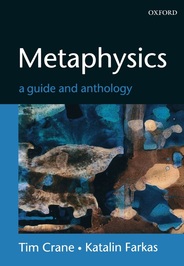
Metaphysics: A Guide and Anthology
Oxford: Oxford University Press 2004
An anthology of central readings on metaphysics, edited by Katalin Farkas and me, including 50,000 words of introductory material written by us
There are ten sections: God, Realism & Idealism, Being, Universals & Particulars, Necessity, Causation, Time & Space, Identity, Mind & Body, Freedom & Determinism
Oxford: Oxford University Press 2004
An anthology of central readings on metaphysics, edited by Katalin Farkas and me, including 50,000 words of introductory material written by us
There are ten sections: God, Realism & Idealism, Being, Universals & Particulars, Necessity, Causation, Time & Space, Identity, Mind & Body, Freedom & Determinism

The Mechanical Mind: A Philosophical Introduction to Minds, Machines and Mental Representation
First edition, Penguin Books 1995
Second edition, substantially revised, Routledge 2003
Third edition, even more substantially revised, Routledge 2016
An introduction to the problems of mental representation and to some of the central questions in the philosophy of cognitive science and artificial intelligence. The third edition includes extensive discussion of extended cognition and externalism.
Japanese translation, Keiso Shobo 2001
Swedish translation, Medvetandets Mekanik, Thales 2004
Spanish translation, La Mente Mecanica, Fondo de Cultura Economica 2008
Arabic translation, National Centre for Translation, Egypt
Persian translation 2024
Chinese translation forthcoming
First edition, Penguin Books 1995
Second edition, substantially revised, Routledge 2003
Third edition, even more substantially revised, Routledge 2016
An introduction to the problems of mental representation and to some of the central questions in the philosophy of cognitive science and artificial intelligence. The third edition includes extensive discussion of extended cognition and externalism.
Japanese translation, Keiso Shobo 2001
Swedish translation, Medvetandets Mekanik, Thales 2004
Spanish translation, La Mente Mecanica, Fondo de Cultura Economica 2008
Arabic translation, National Centre for Translation, Egypt
Persian translation 2024
Chinese translation forthcoming
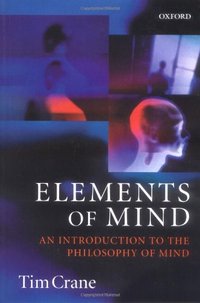
Elements of Mind
Oxford University Press 2001
This book is a defence of the idea that intentionality, the mind's 'direction upon its objects', is the essence of the mind as we experience it. The five chapters are called: Mind, Body, Consciousness, Thought, Perception.
Italian translation, Fenomeni Mentali Rafaelo Cortina 2003
Japanese translation, Keiso Shobo 2011
Persian translation forthcoming
Oxford University Press 2001
This book is a defence of the idea that intentionality, the mind's 'direction upon its objects', is the essence of the mind as we experience it. The five chapters are called: Mind, Body, Consciousness, Thought, Perception.
Italian translation, Fenomeni Mentali Rafaelo Cortina 2003
Japanese translation, Keiso Shobo 2011
Persian translation forthcoming
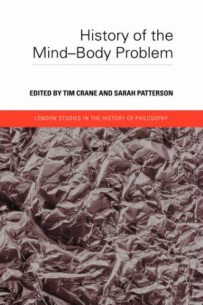
History of the Mind-Body Problem
Routledge 2000
A collection of essays edited by Sarah Patterson and me, on the mind-body problem throughout history. Among the figures discussed are: Aristotle, Aquinas, Descartes, Freud, William James, G.E. Moore, J.L. Austin etc.
Essays by: John Cottingham, Tim Crane, Susan James, Rae Langton, Neil C. Manson, M.G.F. Martin, Sarah Patterson, M.W.F. Stone
Routledge 2000
A collection of essays edited by Sarah Patterson and me, on the mind-body problem throughout history. Among the figures discussed are: Aristotle, Aquinas, Descartes, Freud, William James, G.E. Moore, J.L. Austin etc.
Essays by: John Cottingham, Tim Crane, Susan James, Rae Langton, Neil C. Manson, M.G.F. Martin, Sarah Patterson, M.W.F. Stone
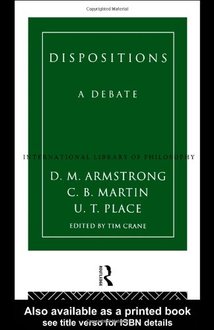
A Debate on Dispositions
Routledge 1996
A debate between D.M. Armstrong, C.B. Martin and U.T. Place, edited with an introduction by me
Routledge 1996
A debate between D.M. Armstrong, C.B. Martin and U.T. Place, edited with an introduction by me
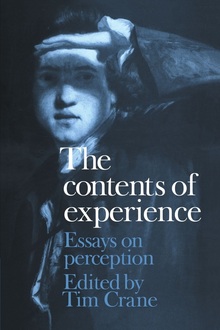
The Contents of Experience
Cambridge University Press 1992
A collection of essays on perception edited with an introduction by me
Essays by: Thomas Baldwin, Tim Crane, E.J. Lowe, M.G.F. Martin, Brian O'Shaughnessy, Christopher Peacocke, Michael Tye and J.J. Valberg
Topics covered: direct perception, the puzzle of experience, sight and touch, non-conceptual content, scenario content, qualia etc.
Cambridge University Press 1992
A collection of essays on perception edited with an introduction by me
Essays by: Thomas Baldwin, Tim Crane, E.J. Lowe, M.G.F. Martin, Brian O'Shaughnessy, Christopher Peacocke, Michael Tye and J.J. Valberg
Topics covered: direct perception, the puzzle of experience, sight and touch, non-conceptual content, scenario content, qualia etc.